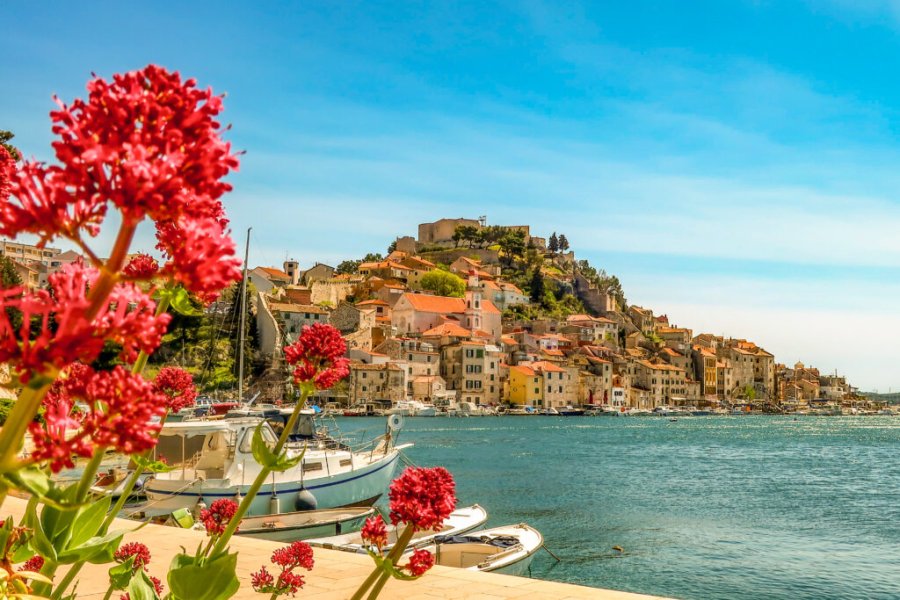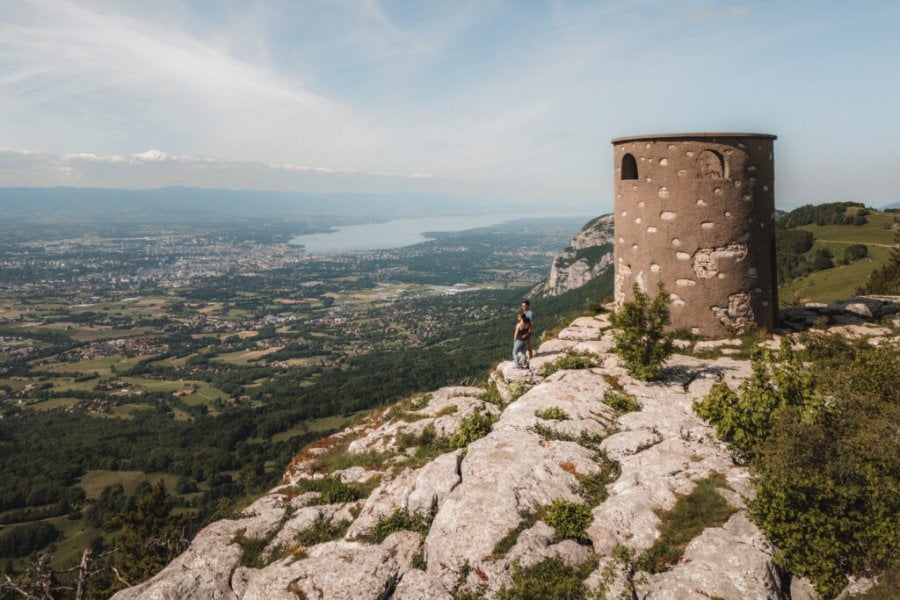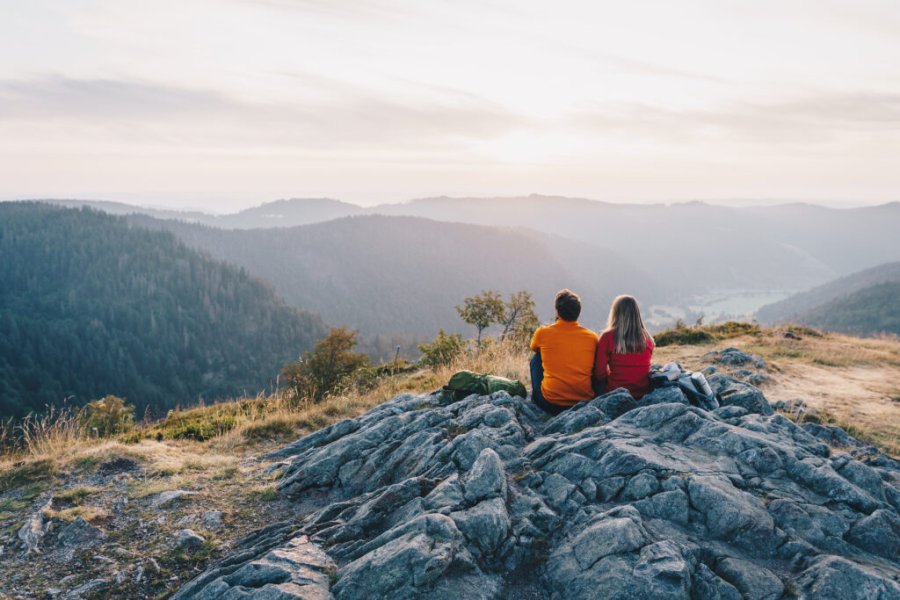6 Day Sand, Sea and Etosha Budget Camping Safari
This budget camping safari might be short only but it is action-packed and stuffed full of many of Namibia’s Best of the Best. The world’s highest sand dunes in the world’s oldest desert await and welcome us.
We spend time in the historic coastal town of Swakopmund, sampling the delights of the excellent restaurants and having the chance to take part in wild activities in and around the coastal area.
Game viewing in the world-renowned Etosha National Park, bringing us back to Windhoek at the journey’s end of one of our most popular safaris.
Points forts du séjour
Pendant votre séjour vous pourrez profiter des points forts suivants : Faune et flore, Aventure / Sports et loisirs, Voyager seul et voyager en groupe.
Meilleurs mois pour partir
La/les meilleure(s) période(s) pour partir est/sont : Janvier, Février, Mars, Avril, Mai, Juin, Juillet, Août, Septembre, Octobre, Novembre, Décembre.
Vous pouvez partir toute l’année.
Comment se rendre sur place ?
Vous pouvez vous rendre sur place en , Car de tourisme.
CHAMELEON SAFARIS NAMIBIA
De 1000€ à 1100€ / personne
Voyage adapté pour :
Détail du séjour : 6 Day Sand, Sea and Etosha Budget Camping Safari - 6 jours
Wednesday Windhoek -Sesriem campsite– 320 km

© Safaris Caméléon
You will be collected from your accommodation within the Windhoek city limits at 07:00 and transferred to Chameleon Safaris Head Quarters For a short pre-departure meeting. There is some lovely mountain scenery on our drive to Sesriem. The road climbs up onto and over Namibia’s central plateau and stops at the small town of Rehoboth for essential supplies, back on the road we pass via the small community at BűellsPort from here we continue on through the desert landscape. We aim to arrive at Sesriem around lunchtime and make our campsite under a huge, ancient camelthorn tree from where we can glimpse the towering red dunes of the world’s oldest desert. We enjoy a late afternoon picnic-style lunch after setting up camp.
In the late afternoon, there is the option with which to start our time in the world’s oldest desert. A short drive will take us to Elim Dune, for the best golden light before sunset. From here, if you would like to, it is a relatively short walk back, through the desert, to our camp
Thursday Sesriem – Sossusvlei – Sesriem – 120km

© Safaris Caméléon
Sunrise in the dunes is the name of the game this morning and that means a pre-dawn start. Our first stop will be at dune 45, so named because it is 45 km from Sesriem, and we cover this first distance in darkness and early morning twilight.
The best time to photograph the dunes is around sunrise and sunset.
We arrive at Dune 45 and climb to a vantage point for sunrise, watching as the colours grow and change with the ever-altering light. Back to the vehicle for a quick breakfast and we carry on for the last few kilometers to the 2×4 car park where all 2-wheel drive vehicles have to stop.
There is a 4×4 shuttle service that will transport us through the sandy terrain of the riverbed. We will visit Dead Vlei, an ancient pan completely surrounded by sand, that is strikingly populated with dead, skeletal camelthorn trees. These trees have been a feature of this landscape for over 1000 years.i. Sossusvlei is almost surrounded by dunes, just one narrow path kept open by the Tsauchab River.
We have time to explore the area on foot and to climb one of the highest dunes in the world, some towering 300 m above us, the views are breathtaking and justly famous.
We drive back to Sesriem for lunch and perhaps a dip in the swimming pool and in the afternoon, we take a short excursion to see the Sesriem Canyon.
Friday Sesriem Campsite -Swakopmund – 350 km

© Safaris Caméléon
Departing after an early breakfast we head west into the desert. We first cross the Namib gravel plains, large areas of flat and seemingly barren terrain broken up by huge mountain inselbergs. Our first stop this morning is the tiny town of Solitaire where we can stretch our legs and sample the apple pie that has made this homestead famous, a quirky little place with amazing photo opportunities in the old farm vehicles scattered around the grounds. We cross the Tropic of Capricorn at 23.5 south degrees. There is a signpost at this auspicious spot and we stop along the road for photos. We have two mountain passes to traverse this morning, first is the smaller canyon of the Gaub River, a tributary of the Kuiseb river Kuiseb Pass. We continue to follow the road to the top of the mountains, dropping steeply down into the canyon carved over eons by the Kuiseb River on its way to debouch into the ocean at the port town of Walvis Bay. We climb up from the banks of the river and over the pass, traveling through the mountain peaks. We emerge from the mountains onto a flat road that takes us all the way to the town of Walvis Bay. We have lunch at Walvis Bay lagoon and complete the final leg of our journey into Swakopmund. Our accommodation tonight is at Amanpuri Travellers Lodge.
Saturday Swakopmund – Etosha National Park – 510 km
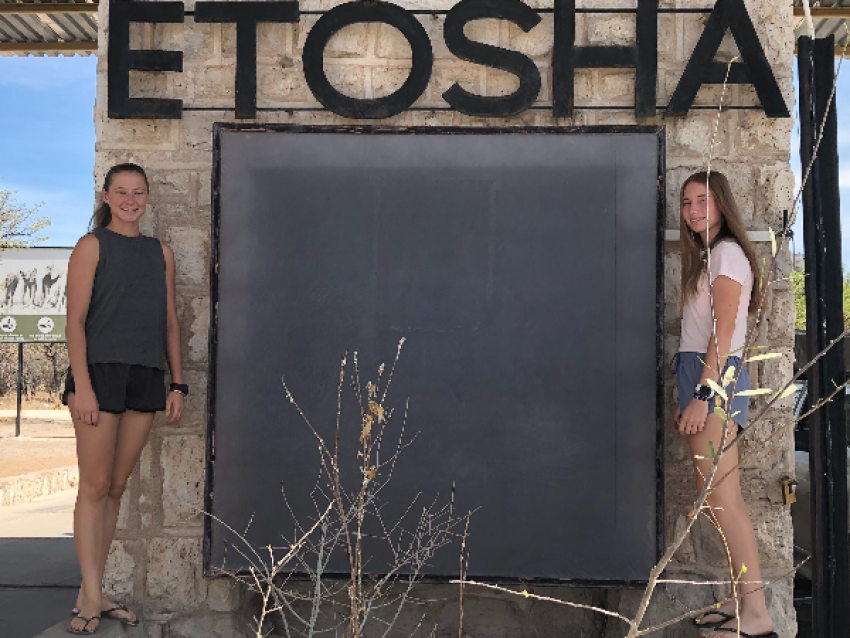
© Safaris Caméléon
After breakfast, we aim to be on the road from 09h00 today. Heading on the main scenic road, passing the small town of Outjo, and onwards to Etosha national park
We are introduced to the park with a short game drive between the main entrance gate, (Anderson Gate), and Okaukuejo Camp with a good chance to spot big game right from the very start. Etosha is huge, just over 22,000 square km and is home to 114 species of mammal, 350 species of bird, 110 species of reptile, uncountable numbers of insects and, somewhat bizarrely, one species of fish.
After setting up our campsite, depending on time, we will head out for a short late afternoon game drive in search of big game. Elephant, rhino, giraffe and the big cats are often seen in this area. We also look for the smaller species, several types of antelope and gazelle abound, zebra are common and the bird life can be spectacular.
All visitors must be back in camp at sunset, but the ‘game show’ doesn’t stop when the sun goes down. Assessable on foot and only a short walk from our campsite, Okaukuejo is justly famous for its flood-lit waterhole where we are afforded the chance to see all of Etosha’s treasures. Big cats, elephant and the whole spectrum of smaller game, but in particular, this is our best chance of getting up close to a black rhino. Namibia is the last stronghold of these critically endangered creatures but here, at Okaukuejo, they are regular visitors.
Sunday Okaukuejo – Halali – Okaukuejo – Etosha National Park
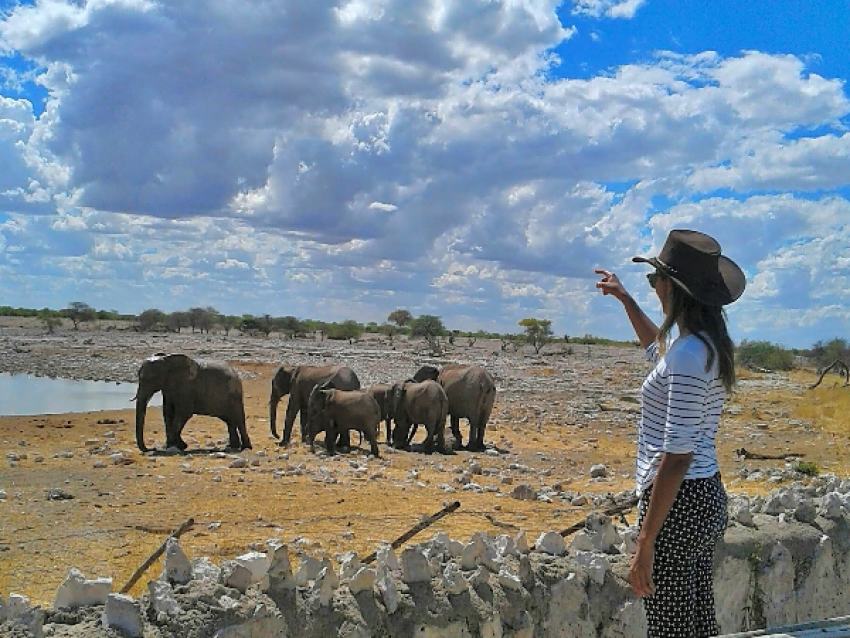
© Safaris Caméléon
We have the whole day to explore Etosha and we want to make the most of it. The park gates open at sunrise and after a quick cup of coffee and a snack we will aim to be on our way as the sun breaches the horizon. Early morning is usually a productive time for game viewing and first thing in the morning is a good time to catch big cats returning from the hunt.
Etosha is a desert landscape and water is the most scarce natural resource. There are however numerous waterholes here, both natural and man-made, and our game driving technique is to take in as many as of these possible. Here we hope that the game will come to us as the animals attend for an early morning drink.
We will have lunch at Halali. There is a small shop with basic merchandise and a few souvenirs and there will also be time for a swim in the pool. There is also time to visit the Halali camp waterhole before we head back out into the park for our afternoon game drive.
On our way back to Okaukuejo we will stop to have a closer look at the Etosha Pan. The name Etosha translates as ‘great white space’ but this name does not do justice to the immensity of the pan. Over 4,700 square km of the dazzling white mineral pan, is so big that it can be seen from space.
Keeping a sharp lookout for game as we wind our way back to Okaukuejo, we aim to arrive back at our just before sunset and just in time for the best hour of the day at the Okaukuejo waterhole.
Monday Etosha National Park -Windhoek – 500 km

© Safaris Caméléon
After breaking camp for the last time, we will game drive to the park exit, hoping to catch sight of some magnificent predators and plains game before heading south to Windhoek, we stop briefly at the small town of Okahandja to refuel our vehicle.
This is also where we will find Namibia’s largest wood carving market. Craftsmen from all over Namibia come here to showcase a wide variety of items both large and small. Here we have the opportunity to collect a truly Namibian souvenir and at the same time to support the local artists and communities.
We aim to be back in Windhoek in the late afternoon. There will be a shuttle service to take you to your accommodation within the Windhoek City limits. We recommend Chameleon Backpackers for great value, centrally located, accommodation.
We aim to be back in Windhoek in the late afternoon. There will be a shuttle service to take you to your accommodation within the Windhoek City limits.
We recommend that departure flights are not scheduled for today.






